- Home
- T. Kingfisher
Seventh Bride Page 3
Seventh Bride Read online
Page 3
“I—uh—Lord Crevan—”
She tried to curtsey, which is nearly impossible on a ladder.
“Perhaps you could come down,” said Lord Crevan, smiling faintly. Rhea was starting to dislike that smile a lot. It was the smile of a man who found nothing funny and everything amusing.
“Um.” Rhea had a mad urge to climb back up to the hopper platform and refuse to budge, but what good would that do?
“What’s a sorcerer?” she asked, climbing down. She concentrated on the rungs in front of her, and not the tall man in the doorway.
“One who practices magic with deliberation,” he said. “Not one of the minor little talents that abound.”
“Oh.” The ladder was very short. Rhea was at the bottom much faster than she wanted to be. She wondered what “with deliberation” meant. “Er. That’s nice?”
Crevan smiled again.
Rhea shuffled out from behind the ladder, feeling small and dusty and grubby. Crevan was wearing white again. His clothes shone like a swan’s feathers.
She made it as far as one of the wooden pillars, fetched up against it, and couldn’t make herself go any farther. Through the open doorway, she could see the back end of Crevan’s big pink horse.
You’d think if he was that good a magician, he’d be able to turn his horse some color other than pink…
“Come to my house,” he said abruptly. “Three days from now.”
“What?”
“Are you hard of hearing? I can speak more loudly if you are.”
Rhea flushed. She felt blood rushing into her face, her cheeks tingly, then hot. Her head ached.
There were so many things she wanted to say, and she could not think of any of them. Except No, and that was the one thing she couldn’t say.
“How will I find your house?” she asked instead.
“North, from the spring, into the wildwood. There’s a road. Set out at dusk,” he said. “The road is very white in the moonlight. You will not go astray.”
“North of the spring?” Rhea had been to that spring a hundred times and knew perfectly well that there was no road.
“There is a road,” he said again.
“At night?” said Rhea, who didn’t quite dare to argue.
“Are you afraid?” he asked. His smile was lazy and cruel and she didn’t like it at all.
“No—yes! The woods are full of wild animals, and bandits, and—and—who knows what—”
“Not these woods,” he said. “Not along the white road. I should not leave it, if I were you, though.”
“But—”
“Until then,” he said. He moved closer, and Rhea wanted to back up, but couldn’t. You didn’t back away from your fiancé, and anyway, the ladder was in her way.
He bowed, and kissed her hand again.
The pink horse’s hooves clattered merrily along the road as he rode away. Rhea wiped her hand against her breeches. His lips hadn’t been particularly damp, but there seemed to be a weight where they had touched, as if her skin was heavier.
CHAPTER FIVE
“Set out at night?” said her aunt. “Well, that’s unusual, but doubtless there’s a good reason.”
They were in the cottage, and Rhea was having a bath in the copper tub before the fire. She was not enjoying it, but she had not enjoyed anything since Lord Crevan had come, three days ago, and told her to where to find his house.
“Good reason? What possible reason could there be?”
Her aunt dumped an ewer of hot water over her head, while Rhea spluttered. “Perhaps he’ll be away until late that day, on business.”
“Then—pfffbt! spleh!—why not have me come the next day, or the day before?”
Her aunt frowned down at her. “I’m sure he’s got a reason, right enough. Keep civil, Rhea, and don’t borrow trouble. This is a great opportunity for you, if you mind your manners and don’t drive him away with your tongue.”
“But—”
“No buts!”
“I’m sure it’ll be fine,” said her mother
Rhea had heard that tone of voice before, last spring, when the really fantastic storm had come up, and her mother had convinced her father to wait it out in the cottage, instead of running to check on the mill. “I’m sure it’ll be fine,” she’d said, not because she expected it to be fine, but because it didn’t matter whether it was fine or not, there wasn’t anything to be done about it, and there was no sense being miserable while they waited to find out.
She could see, in an odd way, what they were doing.
It was as if the words they spoke were a kind of net, a net of normalcy and propriety and sanity, which they were weaving all together.
The proposition that Lord Crevan had made was not normal. Betrothed girls did not go alone to the houses of relative strangers, even the strangers they were betrothed to. Certainly not when no one had ever seen the house, and knew only that it lay tucked in the dark forest.
They definitely didn’t set out into the woods at night looking for such a house.
The whole thing was just this side of indecent.
But around this proposal, her parents and her aunt were weaving their net of words, out of comments like “Well, certainly he’ll feed you when you get there, I shouldn’t say,” and “Think how lovely it will be, to see the house you’ll be the lady of!” as if they could catch the indecency in it like a fish.
As if, by pretending everything was perfectly normal, it would make things perfectly normal.
“It won’t work,” she said to herself later, having a good sulk down at the unplowed end of the field. “It won’t change anything, pretending everything’s all normal.”
They know that, said the voice in the back of her head, which usually sounded tired, and a bit exasperated. But what else can they do?
“They don’t have to make me go! Lord Crevan said I had a choice!”
Do you really think he meant that? asked the voice at the back of her head in a tone of mild inquiry.
She inhaled. She hadn’t thought—well, obviously she had thought, but most of her hadn’t—that the nobleman’s words might not quite be at face value.
But of course they weren’t. It was like when the Viscount’s rent collector came around twice a year and said “Have you got twenty silver dirham, then?” It wasn’t really a question. It meant “You’d better have the money,” or a really good explanation, like a live badger currently sitting on the strongbox.
You couldn’t not pay the rent. Her family had been millers since time out of mind, the mill itself had been constructed more generations ago than anybody knew, but they didn’t own the mill. The lord did. That was just the way it worked.
And while Viscount Skeller was a pretty good lord, everyone said, and generally understanding about lean times, and held a fine feast for everyone twice a year, and didn’t hold with any indecent customs like riding off with young peasant lasses or hunting two-legged deer, he was still the lord.
Rhea wondered briefly if it would be any good appealing to the Viscount for help. She doubted it. Lord Crevan had asked for her, not ordered.
Ah.
Her lips twisted, as she found the answer, like a terrier finding a rat. There it was. If her father went to the Viscount, Crevan could say, with perfect honesty, that he’d given her a choice, he’d asked her father for her hand, and not compelled her in any way, and he wouldn’t be lying, even if it wasn’t quite true.
Peasants didn’t disobey nobles, even respectable peasants like the miller and the very lowest level of nobles, like Lord Crevan. They especially didn’t disobey nobles that were magicians.
You don’t know that. He said he was a sorcerer, but he hasn’t done anything…anything magicky. Well, other than the spark, and it might have been static. And being a magician doesn’t make you bad.
He’s just a little…off somehow.
It could be anything.
Well, it seemed that she would find out.
She set ou
t at dusk.
Her aunt looked her over and gave a single huff of approval. Her mother hugged her fiercely. “Be polite,” she said. “Be courteous. Be safe.” And then, her voice dropping to a whisper in Rhea’s ear—“Be careful.”
She turned away quickly. It occurred to Rhea that her mother was crying, and that made her feel like crying herself.
They tried to weave the net, but they can’t quite hide the fact that this is wrong, this is strange, this isn’t normal…
“I’ll come with you as far as the spring,” said her father, picking up his walking stick.
“Um,” said Rhea. “Okay. Thank you.”
She looked back at the house, feeling like she should say something, or do something—but there was nothing to be done, and everything had been said already. She picked up one foot and put it in front of the other, and then did it again, and then her father was walking beside her, and she heard the door of the cottage close behind them.
They walked in silence. The spring was only about half a mile away, not far, but the way seemed longer in the dark. Crickets chirped and buzzed in the hedgerows and bullfrogs croaked pitilessly in the shadows.
“I don’t like this,” said Rhea, when it seemed like the silence was filling up her throat, and she had to say something or strangle on it.
“Nor do I,” said her father.
Rhea sagged a little. He didn’t like it. He knew it was wrong. And yet they were still walking together to the spring, because even though her father was one of the most important men in the village, Lord Crevan was a noble, and that was that.
They reached the spring. It was not particularly impressive at this time of year, a dull little seep over the stones. In damper seasons, it was covered in moss, but now the outer edges of moss had gone dry and baked in the heat.
On the north side of the spring was the wild wood.
There is a road, Lord Crevan had said.
Rhea didn’t see anything but woods.
Is this going to be magic? Oh Lady of Stones, I bet it is…
She walked towards the wild wood, aware that her father was standing beside the spring, wondering what she would do if there wasn’t a road. Could she go home? Maybe she could. If Lord Crevan showed up again, she could just say that she’d looked, and there wasn’t a road, and it wasn’t like she could crash through the wild wood at night and—
There wasn’t a road.
There was a path.
It didn’t look much bigger than a deer trail, the kind of track worn by animals coming to the spring to drink. Tree roots lay across it like coiled ropes. It definitely wasn’t a road. A road was something you drove carts and oxen down. You could ride a horse down a road. Lord Crevan couldn’t possibly ride his stupid pink horse down this little twisty track, but he expected her to follow it, a fact which struck Rhea as enormously unfair.
Her father came up beside her and looked down the deer trail. “Is that it?” he asked.
“I guess,” said Rhea. “He said north of the spring.”
“Well,” said her father doubtfully, “I suppose his hunting lodge could be in the woods there…” (Which was ridiculous, Rhea thought, because if a lord’s hunting lodge had been that close to the village, everybody would know about it, but she didn’t say it out loud because everything was awful enough already.)
He hugged her. “Be careful,” he whispered, as if he didn’t dare say it aloud. And then, miserably, “I’m sorry.”
Rhea hated Crevan in that moment, not for forcing her to marry him, which was bad enough, but for doing this to her father. Her father was a good man. He was a good miller, and he kept Aunt from cheating the farmers, and he donated money to the church, and when the barn cat had kittens, he never drowned any of them. He didn’t deserve to have some noble come stomping in and putting him in this position.
But here they were. And if she went, it might be bad, but if she didn’t go, it would definitely be bad. For all of them.
Rhea took a deep breath.
“I should go,” she said, and her father nodded. She stepped into the deer trail, putting up an arm to fend off the branches that reached for her eyes.
She wanted to look back at him, but it was dark immediately and she had to feel her way forward in blackness. She had to go one step at a time, planting one foot and then feeling forward with the other one. The roots were humped and tangled and seemed to heave under her feet, and the branches clawed at her.
Something ran across the back of her hand and she shrieked and shook her arm, and the branch she’d been holding back whipped around and smacked her across the forehead.
Now she was really mad.
Rhea snarled, stomping forward, not caring if she fell down and scraped her shins on the roots. She wanted out, out, out!
And then the trees opened up around her, and the white road spread before her, gleaming like bone in the moonlight.
CHAPTER SIX
The road was white. It was edged with a few feet of brittle grass and then the grass turned into the dense tangle of the wild wood. The road itself was as clear as heartbreak.
Rhea turned around and saw that the road ran behind her as well, apparently to the clearing with the spring. Her father was nowhere to be seen.
Magic.
Well, then.
There is a road, Lord Crevan had said.
And such a road. The cobbles were white and round as skulls. Red leaves washed like blood beneath the trees, making dark puddles under the moon.
She took a step forward. She didn’t want to, but the alternative was to stand there until daybreak, because she already knew that she couldn’t go back.
She took another step.
The sound of the crickets was muffled now, but there were other noises from the wildwood—bugs, birds, tree limbs. She could hear a whippoorwill off in the distance, shouting whip-poor-wil! whip-poor wil! in defiance of any others of his kind that might be nearby.
She kept walking.
Her anger drained out of her with every step, like water sloshing out of a bucket. What did it matter if she was angry? The white road didn’t care. Lord Crevan didn’t care. Her being angry made no difference at all.
Nothing Rhea did made any difference at all.
Something groaned in the woods that definitely wasn’t a whippoorwill. It was a gassy bubbling noise, like a belch.
Did bears belch? What about trolls?
She kept walking. Her footsteps were slow and plodding. The road shone savagely before her, and she might as well have been a dark-shelled beetle crawling along it. There was a bear or a troll or maybe a giant savage man-eating whippoorwill in the woods.
She didn’t realize she was crying until the road had become too blurred to see, and then a great aching sob came up her throat and she staggered sideways off the road and into the grass.
It’s all very well to cry for any number of reasons, including the fact that sometimes you simply need a good cry. And since a lot of the reasons for crying occur largely in your head—which is not to say that they’re not real—it actually helps, because after five or ten minutes sobbing into a pillow, the world may not be any better, but at least you don’t feel quite so much like crying. The red hollow under your breastbone is emptied out, and things can be faced with more resolution. (And a swollen nose and itchy eyes, of course, but you can’t have everything.)
The problem with crying in the woods, by the side of a white road that leads somewhere terrible, is that the reason for crying isn’t inside your head. You have a perfectly legitimate and pressing reason for crying, and it will still be there in five minutes, except that your throat will be raw and your eyes will itch, and absolutely nothing else will have changed.
Rhea’s throat was raw and her eyes itched, and she realized that she didn’t have a handkerchief. Her face was wet with tears and all the other unfortunate fluids that show up when you’ve had a really good cry, and the lack of a handkerchief seemed like a whole new reason to cry again.
<
br /> She put her forehead on her knees and made a low, animal sound of misery.
She was feeling so wretched that it took several minutes before she realized something was touching her leg.
Rhea looked up.
There was a hedgehog sitting next to her, with one small paw pressed against her thigh.
She made the awkward gulping noise of someone who was trying to stop crying because something completely unexpected has just occurred.
The hedgehog saw that it had her attention and held up something in its paws.
It was a leaf.
She stared at the leaf. It was rather large and silvery, with a slight fuzziness to it.
The hedgehog bobbed its head and pushed the leaf towards her in an unmistakable gesture.
The smaller part of her brain had stopped crying and was saying No. No, no, no. This is crazy. This is not normal hedgehog behavior!
However, the larger part of her brain, the automatic part that covered her mouth when she sneezed and said, “Excuse me,” when she moved through a crowd, felt that all such concerns were secondary, because she needed a handkerchief right now. Things were happening in her nose that needed to be stopped immediately.
She took the leaf and wiped her face, and blew her nose. It was a very soft, very absorbent leaf. The hedgehog obviously knew what it was doing.
“Thank you,” she said hoarsely.
The hedgehog nodded.
This is not normal.
It was quite an ordinary looking hedgehog. It was six or seven inches long, and prickly. Its face was small and pointed, with large dark eyes.
“Are you really a hedgehog?” she asked, gulping a bit. “Are you a fairy or under a spell or something?”
The hedgehog shook its head.
“No, you’re not a fairy, or no, you’re not a hedgehog?”

 Paladin's Strength
Paladin's Strength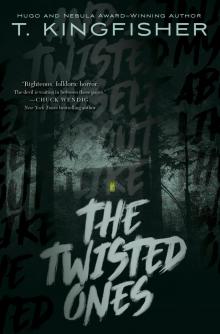 The Twisted Ones
The Twisted Ones The Hollow Places
The Hollow Places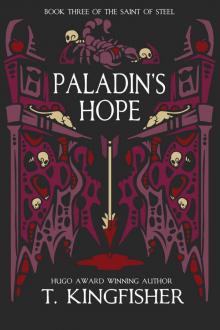 Paladin’s Hope: Book Three of the Saint of Steel
Paladin’s Hope: Book Three of the Saint of Steel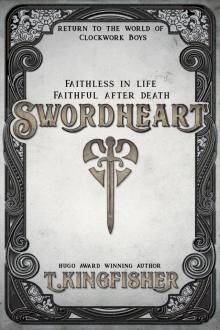 Swordheart
Swordheart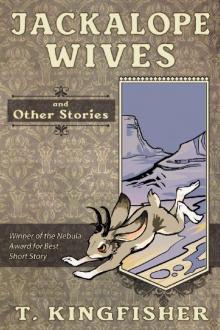 Jackalope Wives And Other Stories
Jackalope Wives And Other Stories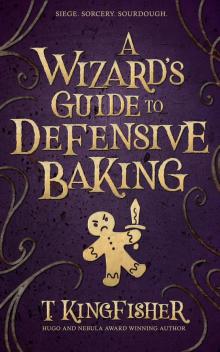 A Wizard's Guide to Defensive Baking
A Wizard's Guide to Defensive Baking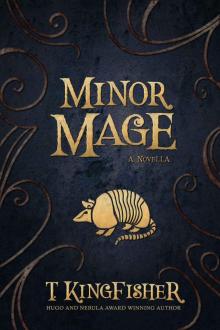 Minor Mage
Minor Mage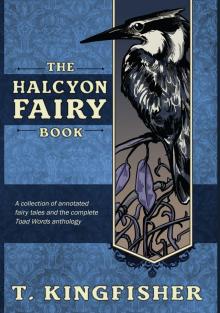 The Halcyon Fairy Book
The Halcyon Fairy Book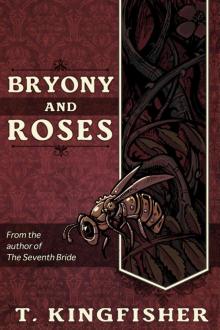 Bryony and Roses
Bryony and Roses The Wonder Engine_Book Two of the Clocktaur War
The Wonder Engine_Book Two of the Clocktaur War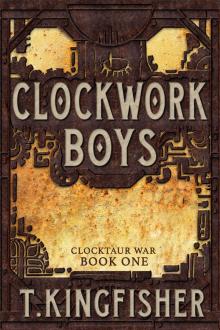 Clockwork Boys: Book One of the Clocktaur War
Clockwork Boys: Book One of the Clocktaur War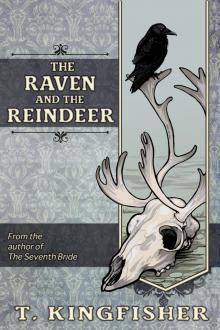 The Raven and the Reindeer
The Raven and the Reindeer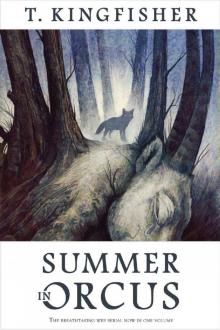 Summer in Orcus
Summer in Orcus The Wonder Engine
The Wonder Engine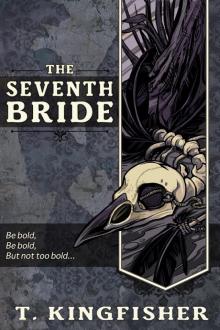 Seventh Bride
Seventh Bride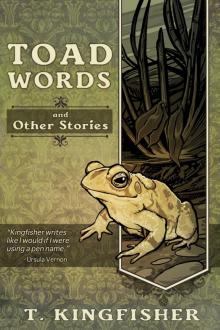 Toad Words
Toad Words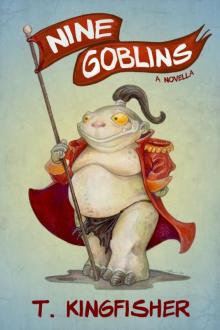 Nine Goblins
Nine Goblins